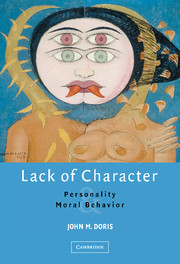Book contents
- Frontmatter
- Contents
- Preface: A Renaissance of Virtue
- Lack of Character
- 1 Joining the Hunt
- 2 Character and Consistency
- 3 Moral Character, Moral Behavior
- 4 The Fragmentation of Character
- 5 Judging Character
- 6 From Psychology to Ethics
- 7 Situation and Responsibility
- 8 Is There Anything to Be Ashamed Of?
- Notes
- References
- Acknowledgments
- Author Index
- Subject Index
3 - Moral Character, Moral Behavior
Published online by Cambridge University Press: 05 July 2014
- Frontmatter
- Contents
- Preface: A Renaissance of Virtue
- Lack of Character
- 1 Joining the Hunt
- 2 Character and Consistency
- 3 Moral Character, Moral Behavior
- 4 The Fragmentation of Character
- 5 Judging Character
- 6 From Psychology to Ethics
- 7 Situation and Responsibility
- 8 Is There Anything to Be Ashamed Of?
- Notes
- References
- Acknowledgments
- Author Index
- Subject Index
Summary
The trouble with Eichmann was precisely that so many were like him, and that the many were neither perverted nor sadistic, that they were, and still are, terribly and terrifyingly normal.
Hannah ArendtTotalitarianism specializes in the dissolution of fortitude, whether by the extremes of physical torture (Bettelheim 1943) or by the psychological degradation of “thought reform” or “brainwashing” (Lifton 1956; Schein 1956). These practices are repellent, but their effects are not unexpected. Aristotle (1984: 1115b7—9) acknowledged that some things exceed human endurance, and Russell (1945: 267), with another 2,000-odd years of history to consider, remarked that the will withstands the tyrant only so long as the tyrant is unscientific. Situationism teaches something more surprising and, in a sense, more disturbing. The unsettling observation doesn't concern behavior in extremis, but behavior in situations that are rather less than extreme; the problem is not that substantial situational factors have substantial effects on what people do, but that seemingly insubstantial situational factors have substantial effects on what people do. The disproportionate impact of these “insubstantial” situational factors presses charges of empirical inadequacy against characterological moral psychology: If dispositional structures were typically so robust as familiar conceptions of character and personality lead one to believe, insubstantial factors would not so frequently have such impressive effects. In the present chapter, I'll document the evidence for this contention.
- Type
- Chapter
- Information
- Lack of CharacterPersonality and Moral Behavior, pp. 28 - 61Publisher: Cambridge University PressPrint publication year: 2002
- 2
- Cited by



